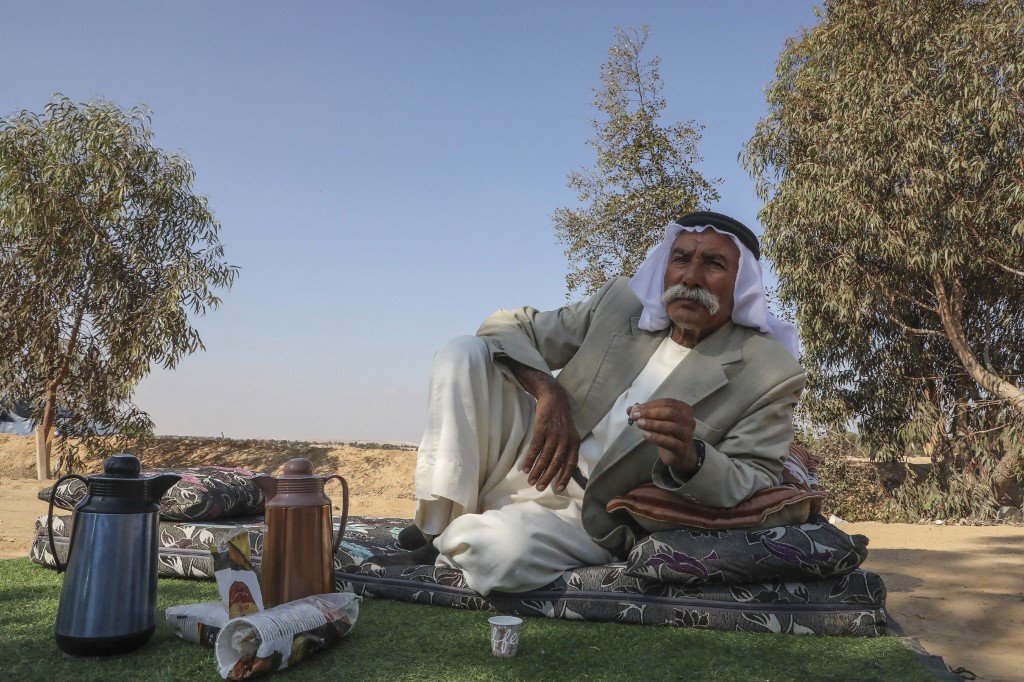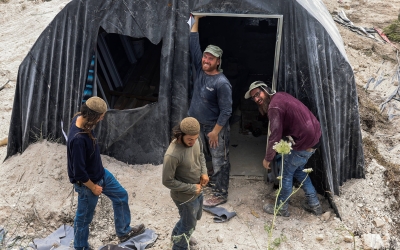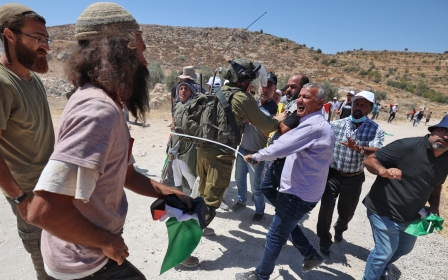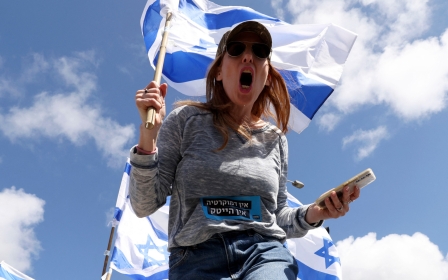Israeli leaders use settlement policy to establish 'Jewish sovereignty' over all land

One of the central tenets of the current Israeli government is the establishment and expansion of settlements, the assertion of the supremacy of the Jewish state and the claim of Jewish sovereignty over the "entire land of Israel".
Under the first clause of its fundamental policy lines, the current Israeli government explicitly states: "The Jewish people have the exclusive and indisputable right to all the land of Israel." In parallel, the government asserts its role in maintaining the character of the Jewish state and preserving the heritage of Israel.
Further, it is committed to intensifying immigration efforts and welcoming newcomers from across the globe to compensate for Jewish Israelis' dwindling population. It also continues to develop settlements in the Palestinian territories occupied in 1967, reinforcing its strategic objectives.
Concurrently, the government is working to cement Jerusalem's full status as Israel's capital. Development of settlements is an ongoing process throughout the country, including regions like the Galilee, the Naqab (Negev), the Golan Heights and the West Bank.
These areas are targeted for settlement development, production and the initiation of various projects.
New MEE newsletter: Jerusalem Dispatch
Sign up to get the latest insights and analysis on Israel-Palestine, alongside Turkey Unpacked and other MEE newsletters
Expelling Palestinians
The term "development" used by the various governments of Israel simply translates to more confiscation of Palestinian land, further entrenching the occupation.
The far-right Religious Zionism party now wields unprecedented powers to execute its settlement policies
This has been the case in the Naqab, where Israel has been expelling Palestinians. At the end of May, Israeli authorities demolished Palestinian tents in the village of Al-Araqib, which the government refuses to recognise despite its existence since before the establishment of the state.
This is the 216th time that this town has been demolished and its people forced to leave.
In fact, the police have arrested the leader of the village and Bedouin activist, Sheikh Sayah al-Turi, several times, along with his son and his wife, to pressure him and his community to leave their homes.
Following its election, the current government immediately began carrying out a December 2021 plan to expand settlements in the Golan Heights and double its population to 100,000 by the year 2025. The government has acknowledged this area as strategically significant for the State of Israel, highlighting its substantial development potential.
Additionally, the government is bolstering the Jewish character of the state through educational programs that reinforce the principle that the Jewish people alone possess the right to all the land of Israel.
Religious Zionism party leader and Finance Minister Bezalel Smotrich has been given sweeping authority over the West Bank, overseeing settlement development and occupation policies where Israel maintains full security and civilian control.
In addition, a member of Smotrich's party now occupies a key position in the Ministry of Security. This appointee plays a crucial role in selecting the leader of the Civil Administration of the 1967 occupied territories, as well as coordinating Israeli government activities there.
The far-right Religious Zionism party now wields unprecedented powers to execute its policies concerning Palestinians and settlers in the West Bank - in line with its settler Zionist ideology.
Meanwhile, another far-right leader and member of Itamar Ben Gvir's Otzma Yehudit (Jewish Power) party, Negev, Galilee and National Resilience Minister Yitzhak Wasserlauf, has been tasked with overseeing the Naqab and Galilee portfolios in territories occupied since 1948. His appointment was announced as part of "the creation of a new body to ease the path towards legalising about 70 illegal outpost settlements in the West Bank".
It's clear to observers that the phrases "settlement development" and "development of initiatives and production" used in policy outlines relating to the Golan Heights, the West Bank and the Naqab are thinly-veiled references to the reinforcing and expansion of settlements.
This involves increased seizure of Palestinian lands, demolition of their homes and displacement of the residents - a process that has been in motion since the state's inception. Given Ben Gvir's party's control over the Naqab and Galilee portfolio, and Smotrich's authority over the West Bank and Gaza Strip, the enforcement of these policies is expected to be swift and marked by bloodshed.
To stabilise and deepen settlements, Smotrich recently instructed Israeli government ministries to prepare themselves to accommodate an additional 500,000 settlers in the West Bank, and also to prepare themselves to develop infrastructure and services in settlements and outposts. The cost of this step amounts to billions of shekels. Smotrich stressed in several closed sessions that this is a "fundamental task" for the government.
As finance minister, it is clear that Smotrich will allocate budgets for settlements at the expense of other things.
Repealing the 'disengagement plan'
The Israeli parliament has introduced several laws bolstering the existing settlements, leading with a law that nullifies any disengagement from the West Bank and the Gaza Strip - a move that has secured approval from the Knesset.
This law effectively repeals the 2005 "disengagement plan" in which only four settlements in the northern West Bank, the "Ganim", "Kadim", "Homesh" and "Sanur" were dismantled along with those in Gaza.
The legislation has the clear aim of legitimising ad hoc settlement outposts in the northern occupied West Bank and facilitating the settlers' return to these previously dismantled settlements.
Notably, it also terminates the criminal penalties that were previously imposed on settlers who enter or reside in these settlements, located on Palestinian land. These penalties were previously enforced under the "Gaza Disengagement Law".
The settlement policy gave the green light to more rights violations and theft of Palestinian lands. Settlers have recently restored construction and residence at the site of the evacuated Homesh settlement, which is built on private Palestinian land.
Israeli bulldozers built a new road surrounding the settlement, which overlooks the West Bank village of Barqa in the Nablus Governorate, in order to facilitate settlers' access to the settlement, especially their movement and relocation. The settlers replaced a tent erected there with a building made of stone to establish their presence and closed the area off with an iron gate. The soldiers have been stationed there to protect them and prevent Palestinian farmers from reaching their land, arresting them on sight.
Since the current administration was sworn in, seven legislative initiatives have been introduced, aimed at the annexation of the Jordan Valley and the enforcement of "Israeli sovereignty" and Israeli law on the settlements and Jewish settlers residing in the Jordan Valley. In December 2022, four such law proposals were brought before the Knesset, and at the onset of 2023, three additional initiatives were introduced:
A law proposing the assertion of Israeli sovereignty over the Jordan Valley was initially introduced on 16 January of this year, followed closely by another proposal on 20 February. The proposed legislation is defined by a set of core objectives: the equal application of law, governance, administration and sovereignty to all citizens of Israel, including the thousands residing in the Jordan Valley region. This demographic currently falls outside the full remit of Israeli civil law due to the dominance of military courts in the area.
The proposals also seek to extend Israeli law to the industrial zones that cater to settlers, archaeological sites in the region and roads leading to these areas, in an effort to streamline operations for these settlers. The ultimate goal is to ensure these inhabitants, specifically referring to the Jewish population, are accorded the same rights as other citizens across the state.
On 30 January, a legislative proposal was put forward, advocating for a full assertion of Israeli sovereignty over the Jordan Valley. This proposal aims to extend Israeli law and administration to all areas within the Jordan Valley, encompassing all Israeli settlements in the region. As outlined in the proposal, the Jordan Valley is home to 30 Israeli settlements and kibbutz.
The drafters of the proposal underscore the region's unique significance to the State of Israel, highlighting its historical, security and economic value. The Jordan Valley, they argue, serves as Israel's security belt. In addition, the proposal underscores the economic vitality of the settlers in the region, characterising them as pioneers in the export sector, contributing to an export rate of 66 percent - the highest across the state.
Interpreting the implications of the proposed legislation, one could argue that the adoption of laws to enforce full sovereignty and Israeli law over the Jordan Valley would effectively lead to the legalisation and entrenchment of settlements in these areas. This extends to all types of settlements, whether they emerge spontaneously from groups of settlers or are systematically planned and executed by the state itself. Far from being an anomalous condition, the passing of such laws would codify and cement the enduring status of these settlements.
'De facto' annexation
Despite Israel's pledge made at the Sharm El Sheikh Summit on 19 March to halt settlement construction on new residential units for a four-month period, it immediately broke ground on 940 new homes. These include 747 units in the "Beitar Illit" settlement and 193 in the "Efrat" settlement.
According to a Februrary 2023 report released by the Israeli organisation, Peace Now, Israel's Security Cabinet greenlit the creation of nine new settlements - a move achieved by legitimising 10 previously unlawful settlement outposts in the West Bank. The report underscores that this legitimisation will immediately sanction 335 residential units dispersed across 1,100 dunams (110 hectares), of which 420 dunams are privately owned Palestinian lands.
Peace Now further reported that Israel's High Planning Council, a subcommittee of the Civil Administration presiding over the West Bank occupation, sanctioned plans for 7,157 housing units in the settlements. It simultaneously gave the green light to the legalisation of four impromptu settlement outposts, while deliberations over legalisation approving a fifth were deferred.
The approved units comprise 43 construction blueprints across 37 settlements and random outposts, involving the submission of maps for 5,257 housing units and earmarking an additional 1,900 units for ultimate approval. The council ultimately advanced towards approval three improvised outposts - "Mevo'ot Yeriho", "Nofei Nehemia", and "Bnei Kidem". A structural map was also submitted for an additional outpost, "Netiv Ha'avot".
The report highlighted that while the four legalised outposts are technically designated as "neighbourhoods" within existing settlements, they effectively function as new settlements. This is attributed to their considerable expansion and the distance from the settlements to which they were formally annexed, according to Peace Now. A portion of these construction projects will occur in relatively small settlements, implying a significant expansion.
A substantial 80 percent of these plans are sited in settlements nestled deep within the West Bank, in areas experts determined would "create significant obstacles to the future establishment of a Palestinian state". The approval to construct thousands of housing units in the settlements and the legalisation of 15 impromptu settlement outposts within a single week constitutes a de facto annexation.
Statements made by Smotrich and Ben Gvir appear to endorse settlement expansion and the violence perpetrated by settlers. Many will recall the aftermath of a settler attack on Huwwara, during which houses and cars were set ablaze, culminating in the death of a Palestinian. The two Israeli ministers publicly praised a tweet by David Ben Zion, the head of the Settlements Council in the Nablus region, calling for the village of Huwwara to be "wiped off the face of the earth".
Echoing these sentiments, Smotrich reiterated his support for the tweet at an economic conference organised by the Israeli business daily, The Marker, explaining: "Why did I like the tweet? Because I believe that the village of Huwwara should be erased from existence". He further clarified that it is the state's responsibility to obliterate Huwwara, not the task of ordinary citizens.
The approval to construct thousands of housing units in the settlements and the legalisation of 15 impromptu settlement outposts within a single week constitutes a de facto annexation
Smotrich continues to assert that there is no such thing as the Palestinian people. During a recent event in Paris, he dismissed the Palestinians as a fictitious invention not more than a century old.
These remarks embody the religious Zionist ideology, coming from a minister within the Israeli government with the power to shape the occupation policies in the West Bank.
The implications of these statements effectively encourage settlers to persist in attacking Palestinians, compromising their lives and property.
Such rhetoric amounts to an incitement to commit war crimes. Furthermore, the introduction of laws that sanction and expedite the expansion of settlements further infringe on Palestinian rights, including their right to exist, own property and live in peace.
These actions appear to be aimed at achieving the concept of "Greater Israel" while shielding settlers from accountability for their actions.
The views expressed in this article belong to the author and do not necessarily reflect the editorial policy of Middle East Eye.
Middle East Eye delivers independent and unrivalled coverage and analysis of the Middle East, North Africa and beyond. To learn more about republishing this content and the associated fees, please fill out this form. More about MEE can be found here.







